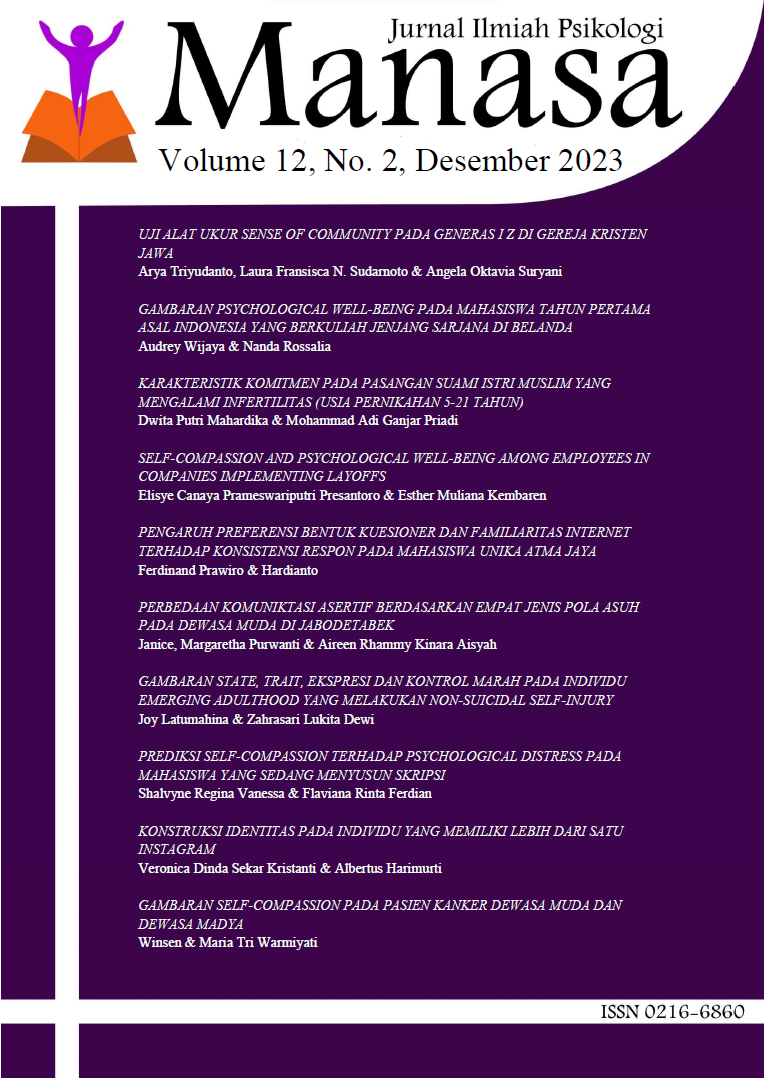Gambaran Psychological Well-Being Pada Mahasiswa Tahun Pertama Asal Indonesia yang Berkuliah Jenjang Sarjana di Belanda
DOI:
https://doi.org/10.25170/manasa.v12i2.4159Keywords:
psychological well-being, mahasiswa internasional, emerging adulthood, tahun pertamaAbstract
Kebanyakan pelajar mempertimbangkan untuk melanjutkan studi di luar negeri sebagai upaya untuk meningkatkan kualitas diri. Jumlah pelajar internasional yang berasal dari Asia di Belanda meningkat dalam beberapa tahun terakhir dan Indonesia merupakan salah satu negara yang mengirimkan mahasiswa terbanyak ke Belanda. Meskipun demikian, berkuliah di luar negeri bukanlah suatu hal yang mudah untuk dijalani mengingat adanya tantangan tersendiri. Penelitian bertujuan untuk mengetahui gambaran PWB mahasiswa tahun pertama asal Indonesia yang sedang berkuliah jenjang sarjana di Belanda. Penelitian ini menggunakan jenis penelitian kualitatif fenomenologi. Metode pengambilan data yang digunakan adalah wawancara semi terstruktur yang dilakukan pada tiga partisipan berjenis kelamin perempuan. Hasil penelitian menunjukkan bahwa dimensi yang lebih menonjol dalam diri partisipan adalah self-acceptance dan positive relationship with others. Kondisi psikologis yang kurang baik disebabkan oleh adanya hambatan dan kesulitan selama masa penyesuaian sebagai mahasiswa internasional dalam bidang akademis dan non-akademis seperti mengelola kehidupan sehari-hari, kehidupan sosial, dan kegiatan lainnya diluar akademis.
References
Abdel-Khalek, A, M., & Tekke, M, (2019). The association between religiosity, well-being, and mental health among college students from Malaysia. Revista Mexicana de Psicologia, 36(1), 5–16. https://www.redalyc.org/articulo.oa?id=243058940001
Agustang, A., Oruh, S., Theresia, M., Pada, A. T., & Asrifan, A. (2021). Kesejahteraan psikologis: Studi pada dewasa madya yang belum menikah di Kota Makassar. https:/doi.org/10.31219/osf.io/v5af8
Akhtar, M., & Herwig-Kroener, B. (2017). Coping styles and socio-demographic variables as predictors of psychological well-being among international students belonging to different cultures. Current Psychology, 38(3), 618–626. https:/10.1007/s12144-017-9635-3
Alpian, Y., Anggraeni, S. W., Wiharti. U., & Soleha, N. M. (2019). Pentingnya pendidikan bagi manusia. Jurnal Buana Pengabdian, 1(1), 66–72. https://doi.org/10.36805/jurnalbuanapengabdian.vlil.581
Chen, F, F., Jing, Y., Hayes, A., & Lee, J, M. (2013). Two concepts or two approaches: A bifactor analysis of psychological and subjective well-being. Journal of Happiness Studies, 14, 1033–1068. https://doi.org/10.1007/s10902-012-9367-x
Clinciu, A. I. (2013). Adaptation and stress for the first year university students. Procedia: Social and Behavioral Science, 78, 718–722. https://doi.org/10.1016/j.sbspro.2013.04.382
Creswell, J. W. (2012). Educational research: Planning, conducting, and evaluating quantitative and qualitative research (4th ed.). Boston, MA: Pearson Education, Inc.
Cohen, S., McKay, G. (1984). Social support, stress and the buffering hypothesis: A theoretical analysis. In Handbook of Psychology and Health. Edited by Baum, A., Taylor, S.E, Singer, J.E. NJ: Hillsdale: Lawrence Erlbaum; 1984.
Compton, W. C., & Hoffman, E. (2013). Positive psychology: The science of happiness and flourishing (2nd ed.). Wadsworth.
Diener, E., Emmons, R, A., Larsen, R, J., & Griffin, S. (1985). The Satisfaction With Life Scale. Journal of Personality Assessment, 49(1), 71–75. https://doi.org/10.1207/s15327752jpa4901_13
Eynon, R., Fry, J., & Schroeder. R. (2017). The ethics of internet research. The Sage Handbook of Online Research Methods, 24–41.
Fabricatore, A.N., Handal, P.J., & Fenzel L.M. (2000). Personal spirituality as a moderator of the relationship between stressors and subjective well-being. Journal of Psychology and Theology, 28(3), 221–228. https://doi.org/10.1177/0091647100028003
Feist, J., Feist, G. J., & Roberts, T. (2013). Theories of personality. New York: McGraw-Hill.
Fitriani, A. (2016). Peran religiusitas dalam meningkatkan psychological well being. Al-Adyan: Jurnal Studi Lintas Agama, 11(1). 57–80.
Halim, C. F., & Dariyo, A. (2016). Hubungan psychological well-being dengan loneliness pada mahasiswa yang merantau. Journal Psikogenesis, 4(2), 170–181. https://doi.org/10.24854/jps.v4i2.344
Harasusilo, Y. E. (2019, April 8). Indonesia urutan ke-22 dunia terbanyak mengirim siswa ke luar negeri. Kompas. https://edukasi.kompas.com/read/2019/04/08/17202111/indonesia-urutan-ke-22-dunia-terbanyak-mengirim-siswa-ke-luar-negeri
Hidalgo, J. L., Bravo, B. N., Martinez, I. P., Pretel, A., Postigo, J. M. L., Rabadan, F. E. (2010). Psychological well-being, assessment tools and related factors. In Wells, I. E. Psychological well-being. (pp. 77-113). New York: Nova Science Publishers, Inc.
Himpunan Psikologi Indonesia. (2010). Kode etik psikologi Indonesia. Kebayoran Baru, Indonesia: Author.
Hunt, E. N., Martens, M. P., Wang, K. T., & Yan, G. C. (2016). Acculturative stress as a moderator for international student drinking behaviors and alcohol use consequences. Journal of Ethnicity in Substance Abuse, 16(3), 263–275. https://doi.org /10.1080/15332640.2016.1185656
Hurlock, E, B. (1978). Perkembangan Anak (1st ed.). Jakarta: Erlangga
Hutapea, B. (2014). Stres kehidupan, religiusitas, dan penyesuaian diri warga Indonesia sebagai mahasiswa internasional. Makara Hubs-Asia, 18(1), 25–40. https://doi.org/10.7454/mssh.v18i1.3459
Leni, N. (2019). Faktor yang membuat 7 negara diakui memiliki sistem pendidikan terbaik di dunia dalam kajian antropologi dan matematika. Prosiding Seminar Nasional Matematika dan Pendiidkan Matematika, 2579–9444.
Li, J., Wang, Y., & Xiao, F. (2014). East Asian international students and psychological well-being: A systematic review. Journal of International Students, 4(4), 301–313.
Lin, K., Hamka., & Rahman, F, F. (2020). Kesejahteraan psikologis mahasiswa baru Indonesia di Taiwan. Journal of International Students, 10(3), 44–57. https://doi.org /10.32674/jis.v10iS(2).2713
Lipson, S, K., Zhou, S., Wagner, B., Beck, K., & Eisenberg, D. (2016). Major differences: Variations in undergraduate and graduate student mental health and treatment utilization across academic disciplines. Journal of College Student Psychotherapy, 30(1), 23–41. https://doi.org /10.1080/87568225.2016.1105657
Maldani, D, I., Setiawan, E. (2021). Pengalaman Komunikasi Lintas Budaya Mahasiswa Undergraduate Indonesia di Belanda. Journal Riset Public Relation, 1(1), 79–89. https://doi.org/10.29313/jrpr.v1i1.176
Moeller, R. W., & Seehuus, M. (2019). Loneliness as a mediator for college students’ social skills and experiences of depression and anxiety. Journal of Adolescence, 73, 1–13. https://doi.org/10.1016/j.adolescence.2019.03.006
Outhred, T., & Chester, A. (2013). Improving the International Student Experience in Australia Through Embedded Peer Mentoring. Mentoring & Tutoring: Partnership in Learning, 21(3), 312–332. https://dx.doi.org/10.1080/13611267.2013.851
Packer, H. (2022, April 22). Record international student numbers at Dutch universities. https://thepienews.com/news/dutch-record-international-student/
Putra, I. K. R. (2020). Pendidikan membebaskan sebagai upaya mewujudkan generasi emas 2045: Telaah pemikiran kritis Paulo Freire. Vidya Samhita: Jurnal Penelitian Agama, 6(1), 73–84. https://dx.doi.org/10.25078/vs.v6i1.2038
Ramdhani, T., Djunaedi., Sismiati., A. (2016). Kesejahteraan psikologis (psychological well-being) siswa yang orangtuanya bercerai: Studi deskriptif yang dilakukan pada siswa di SMK Negeri 26 Pembangunan Kakarta). Insight: Jurnal Bimbingan Konseling, 5(1), 108–115. https://doi.org/10.21009/INSIGHT.051.16
Recruiting from Indonesia in a context of increased competition. ICEF Monitor - Market intelligence for international student recruitment. (2019, December 9). Retrieved March 2, 2022, from https://monitor.icef.com/2019/09/recruiting-from-indonesia-in-a-context-of-increased-competition/
Rujiprak, V. (2016). Cultural and psychological adjustment of international students in Thailand. The Journal of Behavioral Science, 11(2), 127–142. https://so06.tci-thaijo.org/index.php/IJBS/article/view/63286
Ryff, C. D. and Singer, B. (2003). Ironies of the human condition: Well-being and health on the way to mortality. In L . G. Aspinwal and U. M. Staudinger (Eds.), A psychology of human strengths: Fundamental questions and future directions for a positive psychology. (pp. 271-287). Washington, DC, US.: American Psychological Association.
Ryff, C. D. (1995). Psychological well-being in adult life. Current Directions in Psychological Science, 4(4), 99–104. http://www.jstor.org/stable/20182342
Ryff, C. D., & Singer, B. (1996). Psychological well-being: Meaning, measurement, and implications for psychotherapy research. Psychother Psychosom, 14–23. https://doi.org/10.1159/000289026
Shen, Y., Kim, S. Y., & Benner, A. D. (2019). Burdened or efficacious? Subgroups of Chinese American language brokers, predictors, and long-term outcomes. Journal of youth and adolescence, 48(1), 154–169. https://doi.org/10.1007/s10964-018-0916-4
Simanjuntak, J. G. L. L., Prasetio, C. E., Tanjung, F. Y., & Triwahyuni, A. (2021). Psychological well-being sebagai prediktor tingkat kesepian mahasiswa. Jurnal Psikologi Teori Dan Terapan, 11(2), 158–175. https://doi.org/https://doi.org/10.26740/jptt.v11n2.p158-175
Takeuchi, R., Zachry, C., & Brunsting, N. C. (2018). Predictors of undergraduate international student psychosocial adjustment to US universities: A systematic review from 2009-2018. International Journal of Intercultural Relations, 66, 22–33. https://doi.org/10.1016/j.ijintrel.2018.06.002
Udhayakumar, P., & llango, P. (2018). Psychological Wellbeing among College Students. Journal of Social Work Education and Practice, 3(2), 79–89. https://www.jswep.in/uploads/3/1/7/2/31729069/030209_psychological_wellbeing.pdf
Wenhua, H., & Zhe, Z. (2013). International students’ adjustment problems at university: A critical literature review.Academic Research International, 4(2), 400. https://www.savap.org.pk/journals/ARInt./Vol.4(2)/2013(4.2-41).pdf
Willig, C. (2013). Introducing qualitative research (3rd ed). New York: Open University Press.
Yamada, Y., Klugar, M., Ivanova, K., & Oborna, I. (2014). Psychological distress and academic self-perception among international medical students: The role of peer social support. BMC Medical Education, 14(1), 256–261. http://www.biomedcentral.com/1472-6920/14/256
Yin, R. K. (2016). Qualitative research from start to finish (2nd ed). New York: The Guilford Press.
Zhang, J., & Goodson, P. (2011). Predictors of international students’ psychological adjustment to life in the United States: A systematic review. International Journal of Intercultural Relations, 35, 139–162. https://doi.org/10.1016/j.ijintrel.2010.11.011
Downloads
Published
Issue
Section
License
Copyright (c) 2023 MANASA

This work is licensed under a Creative Commons Attribution-NonCommercial-ShareAlike 4.0 International License.









.png)
.png)

